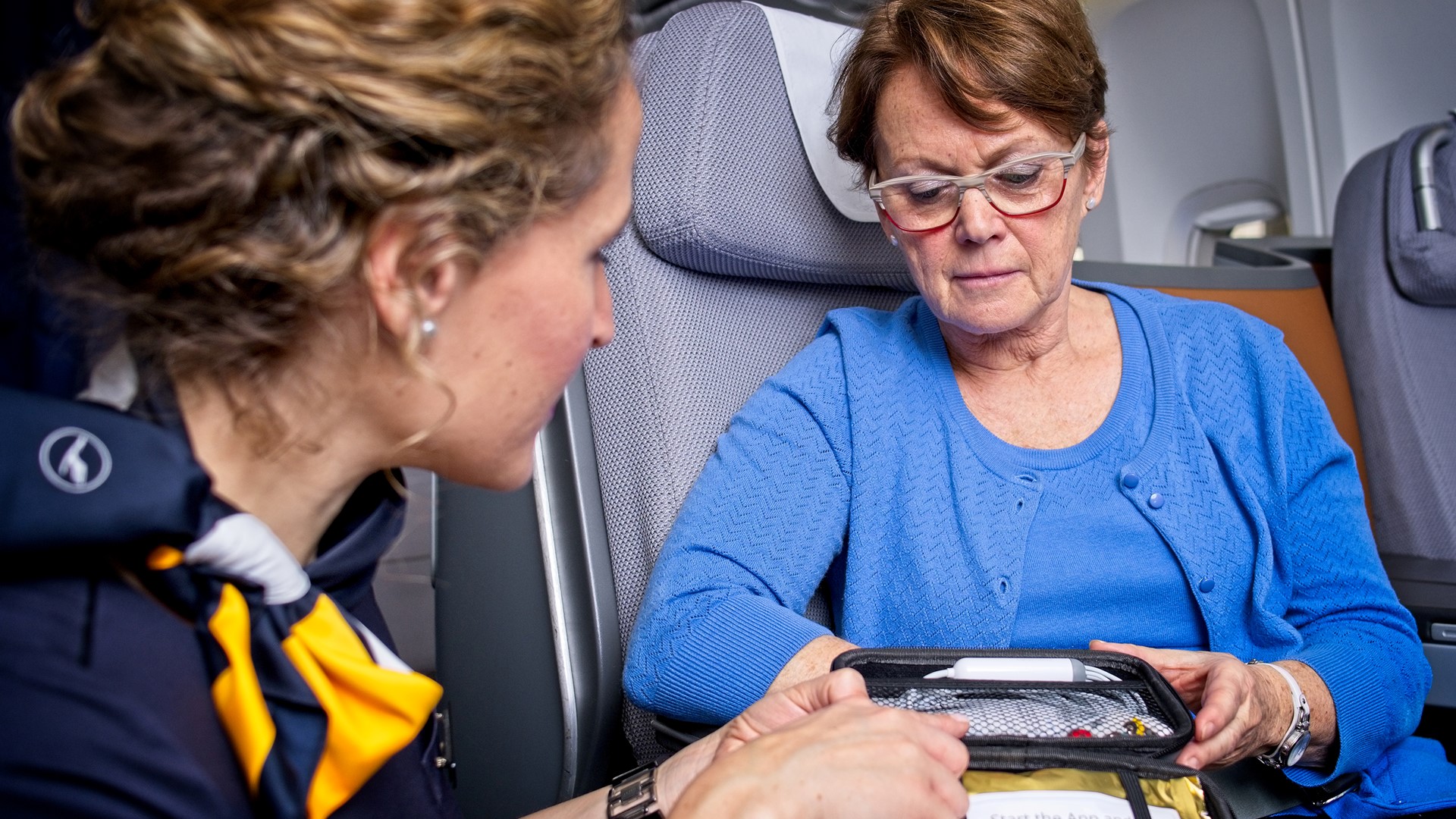- Mobile ECG system will improve medical care for emergencies on all long-haul Lufthansa flights
- Assists cockpit crews when making decisions regarding medical emergencies
- Also new: Lufthansa passengers can now book medical travel assistance
As the first airline in the world to do so, Lufthansa has equipped all long–haul aircraft with the mobile ECG (Electrocardiogram) system CardioSecur. In case of on-board medical emergencies, the compact, intuitive system will allow flight attendants without cardiological expertise to record an ECG for passengers and send the test results directly to a medical hotline on the ground. The system has initially been tested in 2018 on the A380 fleet and now, it will be available for medical emergencies on all long-haul aircraft within the Lufthansa fleet.
“The health of our passengers is very close to our hearts. Especially when they are feeling unwell on board, they should know that they are in good hands with Lufthansa. The results of the resting ECG conducted directly onboard the aircraft provide a better basis for deciding whether it is necessary to divert a plane in order to provide medical care on the ground in case of medical emergencies,” says Dr. Sven-Karsten Peters, a cardiologist with the Lufthansa Medical Service, as he explains the advantages of the system.
Cardiovascular complaints are the most common cause of medical incidents on board. If there are any doctors on the flight, they have been able to use the defibrillator so far as a workaround to better assess the situation. However, the results from that machine cannot replace an ECG.
Getting started with telemedical care with the mobile ECG system
Weighing only 50 grams, the compact mobile ECG system developed and distributed by Personal MedSystems GmbH under the name CardioSecur does not take up much space or weight. It consists of an app on the flight attendant’s Cabin Mobile Device (mini iPad) and a small bag with an ECG cable and four disposable electrodes. If a passenger complains of heart trouble, the system can record an ECG in a few short steps: First, the flight attendant establishes an internet connection via the FlyNet WiFi network on the Cabin Mobile Device and starts the app. The crew then connects the ECG cable to the four electrodes and places them on the upper body of the unwell passenger. The app records a 12-lead ECG; additional parameters such as the patient’s age, weight, gender, blood pressure and oxygen saturation are captured manually.
Fast and accurate data transfer to doctors on the ground via FlyNet
This data will then be transferred from the app to the medical hotline of International SOS (ISOS). This Lufthansa partner can be contacted by pilots and pursers 24/7 in case of medical questions. ISOS will evaluate the ECG and advise the cockpit crew via telephone based on the gathered data. The cockpit crew will then have to make the final decision on whether it is necessary to divert the plane. If there is a doctor among the passengers on board, they can use the expert mode on the app to monitor the heart activity.
The existing program “Doctor on Board” allows the cabin crew to swiftly identify doctors present on board, including their specialties. This program provided by Austrian Airlines, Lufthansa and SWISS currently has 11,000 participating doctors from all specialties who can provide assistance in the case of medical incidents. For this purpose, an optimally equipped emergency kit that exceeds regulatory requirements is available, along with other materials. The crew is also well prepared for emergencies and receives first aid training every year.
Also new: Lufthansa now offers a medical travel assistance service
An additional new feature: Lufthansa now offers a medical travel assistance service in cooperation with the service provider Medical Travel Companion. Passengers can choose to book either a nurse, a paramedic or a doctor to care of them during their entire flight. Lufthansa is the first European airline to offer this service. The medical companion program has different packages that passengers can choose from. Depending on their needs, customers can for example book medical supervision or wound management.
Lufthansa as one of the leading airlines in the area of Health & Medicine
All in all, Lufthansa is a worldwide leader in Health & Medicine among airlines thanks to its extensive medical product portfolio.
For more than 20 years now, Lufthansa has been the only commercial airline company that offers intercontinental intensive care transport: the Lufthansa Patient Transport Compartment (PTC) is available for the repatriation of people who are taken ill abroad or for the transportation of patients who require intensive medical care. The high-tech product is a kind of ‘flying ICU’ (intensive care unit) that unites state-of-the-art technology, competent specialists and efficient processes with the comfort and safety of an isolated ICU.
In addition to that, Lufthansa offers a variety of medical services, for example a stretcher for pre-booked, non-intensive patient transports, provision of medical oxygen or seminars for stress-relieved flying as well as a separate Medical Operation Center (MOC). 365 days a year, the Lufthansa MOC supervises medical transports and answers passengers’ questions, for example regarding fitness for air travel or taking along medication.
For more information on the topic, click on the following link: https://www.lufthansa.com/de/en/travelling-with-special-requirements

